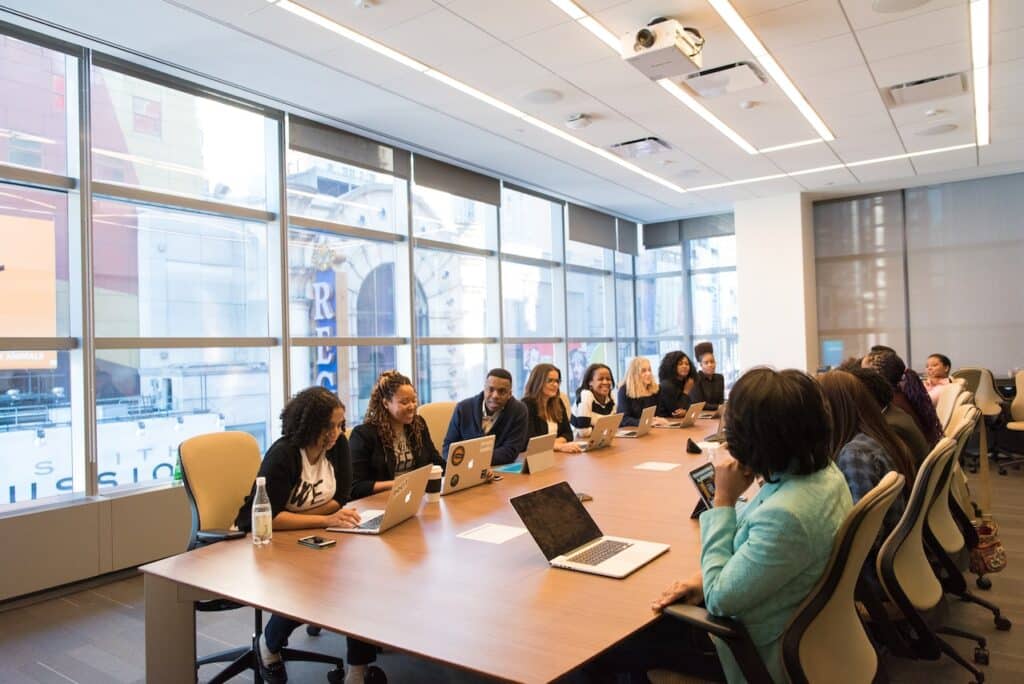The corporate world has progressed at a rapid pace, and the significance of meetings and conferences cannot be understated. Complexities emerge, making the role of professional meeting planners, like EMRG Media, more important than ever. In this blog post, we delve into the fascinating journey of those who orchestrate large meetings and events for businesses and organizations.
Understanding what a meeting planner does and why this role is critical can help provide valuable insight for executives, as well as aspiring meeting planners. Get ready to discover the nuances of the meeting planning process, from plan to execution, and become an insider in the world of professional meeting planners.
The Role of the Meeting Planner
A meeting planner is a professional who is responsible for overseeing the entire process of organizing and managing corporate events, corporate holiday parties, meetings, and conferences. They work closely with clients to understand their needs, objectives, and expectations. Afterward, they translate those objectives into a comprehensive plan to execute a successful event.
Some of the primary responsibilities of a meeting planner include:
- Establishing Objectives: Understanding the goals and desired outcomes of the meetings or events and making sure the planning and execution processes align with them.
- Site Selection: Researching, selecting, and negotiating with venues that suit the meeting’s requirements and objectives.
- Scheduling and Agenda Development: Creating detailed schedules and agendas for the event, including speaker line-ups, breakout sessions, social events, and more.
- Vendor Management: Coordinating with various service providers such as caterers, audiovisual teams, transportation services, and material suppliers.
- Budget Management: Developing, tracking, and managing event budgets, ensuring that expenses are kept within the allocated funds.
- Logistics Management: Handling the myriad logistical aspects of a meeting or event, such as room setups, registration, attendee management, and travel arrangements.
- Risk Management: Identifying potential risks and implementing contingency plans to address them.
- Post-Event Activities: Collecting feedback, analyzing event success, and conducting follow-up actions to improve future events.
New York event planners are thus the backbone of the organization and management of any large-scale event, collaborating with various stakeholders to ensure a successful and memorable experience for all attendees.
Challenges Faced by Meeting Planners
Planning a successful meeting or event is complex and involves navigating numerous challenges. Ignore these, and you risk compromising the event’s success. Here are some of the most common issues event planners face.
Budget Constraints
Financial limitations form one of the most significant challenges facing a New York event planner. Planners are often expected to deliver high-quality events within tight budget constraints. They have to negotiate with vendors, reconsider event elements, and constantly monitor expenses to ensure the event doesn’t exceed the budget.
Time Management
Event planning involves numerous tasks and strict deadlines. Event planning companies in New York often juggle multiple roles and need to use time efficiently to prevent any last-minute issues or overlooked aspects.
Technological Glitches
While technology has its benefits, it invariably introduces technical glitches—unexpected software errors, registration issues, or virtual platform failures can pose significant challenges.
Vendor Reliability
Planners rely heavily on third-party vendors for various services. If a vendor underdelivers or fails to meet the agreed terms, it can heavily impact the event’s success.
Unpredictable Circumstances
Circumstances beyond control, such as extreme weather, unexpected guest cancellations, or even global crises like the COVID-19 pandemic, can drastically affect event planning.
Rising Attendee Expectations
With the event industry’s evolution, attendees now seek a memorable and unique experience. Hence, the challenge lies in continuously innovating and personalizing while meeting these rising expectations.
Sustainability Measures
Implementing sustainable practices in every aspect of event planning is becoming increasingly important but poses a challenge due to perceived increased costs or lack of options.
Overcoming these challenges requires strategic planning, fail-safe backup plans, constant adaptability, and a keen understanding of industry trends. Proactive problem-solving can significantly minimize the impact of these challenges, ensuring a smooth and successful event.
Essential Skills Required in Meeting Planning
Meeting planning is a multifaceted profession that demands an extensive skill set to achieve success. Here are some of the key skills needed to excel in this challenging yet rewarding career:
Strategic Planning and Organization
Meeting planners have to think both creatively and strategically to design an event that resonates with the target audience. They must develop comprehensive plans, track event progress, and organize the many event details to ensure a well-executed event.
Communication
Clear and concise communication is crucial for coordinating with clients, vendors, and other stakeholders. The ability to articulate ideas clearly helps a meeting planner to effectively convey the vision of a successful event.
Negotiation
Since meeting planners often work with various vendors and suppliers, negotiation skills are essential. They must be able to secure advantageous contracts and ensure high-quality services are provided within budget constraints.
Budget Management
Financial management plays a significant role in meeting planning, requiring planners to develop, manage, and reconcile budgets accurately. Financial acuity and the ability to control expenses contribute to successful event cost control.
Attention to Detail
Meeting planners must pay close attention to detail when planning and organizing events. Every aspect, from venue selection to attendee experience, must be addressed and executed flawlessly.
Problem-Solving
Inevitably, obstacles and challenges are bound to emerge during the event planning process. A meeting planner’s ability to think on their feet and develop creative solutions is essential for overcoming these roadblocks.
Time Management
Meeting deadlines and managing multiple tasks concurrently are integral to meeting planning. Strong time management skills are vital to ensuring all aspects of the event come together seamlessly.
The Pre-Planning Phase: Establishing Objectives
Effective meeting planning begins with defining clear objectives. To design a successful event, a meeting planning company in New York must understand and address the expectations and goals of its clients. Here are some steps involved in establishing objectives for meetings and events:
Understand the Client’s Goals
The first step in setting event objectives is to communicate with the client to gain a clear understanding of their expectations. Goals may vary depending on the event’s nature, whether it’s an annual conference, product launch, or awards ceremony.
Set SMART Objectives
After determining the event’s goals, meeting planners must utilize the SMART framework—Specific, Measurable, Achievable, Realistic, and Time-bound—to establish clear and achievable objectives that align with the client’s goals.
Advising and Setting the Vision
Using the established objectives, the meeting planner must advise on the event’s overall vision, including theme, branding, and attendee experience. This vision drives the subsequent stages of the planning process.
Establish Event Metrics and KPIs
Determining key performance indicators (KPIs) from the outset enables the planner to measure the event’s success and provide valuable data for analyzing the event’s impact.
Understanding and setting clear objectives ensure that all subsequent planning and execution steps align with the intended goals, paving the way for a successful event.
The Planning Stage: Site Selection, Scheduling, and Negotiations
After the objectives are set, the event planning can truly begin. This process includes key administrative tasks such as site selection, scheduling, and securing contracts. Each step further details the overall event structure and puts a planner’s skills to use.
Site Selection
Choosing a suitable event location is paramount. This step involves researching potential venues, visiting the sites, evaluating their capacity, and assessing the available amenities and services. Accessibility, cost, and the venue’s impression on attendees are factors to consider. A successful planner selects a location that resonates with the event’s objectives and creates a conducive atmosphere for event activities.
Scheduling
Establishing a detailed schedule is essential for the smooth execution of the event. The meeting planner is responsible for:
- Outlining the pre-event, event, and post-event timeline, detailing important milestones and tasks.
- Arranging speaker and activity sessions that align with the event’s objectives.
- Allocating time for networking, breakout sessions, or entertainment, as applicable.
- Creating a schedule and rigorously adhering to it ensures organized proceedings and a positive attendee experience.
Negotiations
Negotiation is a key aspect of an event planner’s job. Securing contracts with suppliers, vendors, and speakers happens at multiple stages of the planning process. A successful planner understands the event’s budget and is able to negotiate for quality services within the set financial boundaries. They craft contracts that outline delivery expectations, timelines, cancellation policies, and other relevant conditions.
Effective negotiation ensures valuable relationships are maintained with the providers. By organizing terms fit for both parties, meeting planners promote reliability and commitment, contributing to the event’s success.
These actions form the basis of planning, setting the stage for the event’s success. Emphasizing the correct site selection, comprehensive scheduling, and successful negotiations allows for the event to begin taking shape toward its objectives.
Execution Phase: Vendor Management, Budget Control, and Logistics
The execution phase is where planning meets action. Once the site selection, scheduling, and negotiations are complete, it’s time for effective management of vendors, budget, and logistics.
Vendor Management
Vendor management involves coordinating with several different suppliers, from caterers and decorators to musicians and speakers. The meeting planner’s role is to ensure that all vendors are well-informed about their responsibilities and perform their duties as per the agreed contracts. Timely communication and an understanding of each vendor’s role contribute to seamless execution and error minimization.
Budget Control
Throughout the planning and execution phases, paying detailed attention to budget management is a top priority. A detailed budget outline provides a financial roadmap for the event and helps prevent overspending. The meeting planner tracks all expenses, verifies all supplier invoices, ensures that all charges align with the agreed terms, and handles any financial discrepancies. Tight control over the budget can result in cost savings and even enable planners to deliver a top-notch event at a lesser cost than anticipated.
Logistics Management
Logistics management is one of the more complex tasks in the meeting planner’s role. It encompasses various responsibilities, such as:
- Setting up the venue according to the event’s needs.
- Managing transportation and accommodation arrangements for speakers and attendees.
- Overseeing on-site registration and attendee management.
- Preparing for any changes or disruptions to the plan, for example, unexpected guests or changes in the schedule.
Effective logistics management ensures a smooth event experience for everyone involved. From attendees to speakers to vendors, comprehensive logistics planning contributes to seamless event execution.
The execution phase is the culmination of the meeting planner’s efforts. It’s the time when initial objectives, planning, budgeting, and logistics all come together, paving the way for a successful event.
Post-Event: Debriefing, Evaluations, and Reporting
After the event concludes, the planner’s role shifts to post-event responsibilities. This includes debriefing, evaluations, and reporting, which are crucial for analyzing the event’s success and drawing lessons for future planning.
Debriefing
Debriefing means gathering stakeholders, such as the event planning team, vendors, and the client, to discuss the overall event experience. The focus lies on:
- Reviewing the event against the established objectives and KPIs.
- Identifying areas of success and where improvements are needed for future events.
- A thorough debrief promotes a culture of continuous improvement and constructive feedback that helps planners grow and excel in their careers.
Evaluations
Evaluations assist in gathering valuable insights into the event from the attendee’s perspective. Some techniques for acquiring participant feedback include:
- Online surveys distributed through email or social media.
- In-person feedback during or immediately after the event.
- Post-event phone calls or focus group discussions.
Analyzing the collected data helps to assess the event’s success and gain insights into what resonated with the audience and what could be improved upon.
Reporting
Reporting involves compiling the event’s outcomes and communicating them to the client. This information should highlight:
- The level of success in achieving the set objectives.
- Insights gained from evaluations and feedback.
- An overview of cost management and budget performance.
A comprehensive event report helps the client evaluate the event’s impact and determine the effectiveness of their investment in the event.
The Role of Technology in Meeting Planning
As the events industry evolves, leveraging technology is essential for meeting planners to streamline processes, collect data, and enhance attendees’ experiences.
Event Management Platforms
Event management platforms offer tools to automate and optimize various planning tasks, such as registration, scheduling, and ticketing. These platforms help save time, minimize errors, and enhance the overall event organization.
Mobile Event Apps
Mobile event apps provide a convenient and interactive way for attendees to access event information, such as schedules, speaker profiles, and venue maps. These apps can also facilitate live polls, Q&As, and networking opportunities among attendees.
Data Analytics
Data analytics tools allow meeting planners to collect, analyze, and report on event outcomes. From attendee demographics to engagement metrics, data analytics can provide valuable insights into event performance and inform future planning decisions.
The adoption of technology by meeting planners is critical to staying ahead in the competitive event planning industry. Understanding and embracing technology allows planners to create more relevant, targeted, and engaging events that exceed client and attendee expectations.
Importance of Networking for Meeting Planners
Networking plays a crucial role in the event planning industry; it opens doors to new opportunities, promotes learning from peers, and contributes to career development.
Building a Strong Business Network
Establishing strong professional relationships can lead to potential business opportunities. Contacts made at industry events, seminars, or training sessions can turn into potential clients, vendors, or collaborators in the future. A diversified network can provide a wide range of resources and support when planning successful meetings.
Continuous Learning from Peers
Networking allows meeting planners to share experiences and learn from one another. It can offer insights into new trends, technologies, and methods deployed by peers, thereby fostering professional growth. Keeping a pulse on industry norms helps planners remain competitive and innovate their planning strategies.
Enhancing Professional Reputation
Participating actively in industry events, online networking platforms, or professional associations can enhance a meeting planner’s reputation and credibility. A reliable network can further influence recommendations and beneficial partnerships. Hence, maintaining a visible presence through networking is essential.
Networking is a long-term investment that requires regular nurturing of professional relationships. It delivers value by expanding the planner’s horizon of opportunities and contributes significantly to their career growth.
The Future of Meeting Planning
The meeting planning industry is evolving, driven by factors like technology advancements and changing attendee expectations. Here are some trends that will shape the future of meeting planning:
Hybrid Events
Hybrid events, combining in-person and virtual experiences, offer the flexibility of location and widen the potential attendee reach. Post-pandemic, hybrids are expected to become the norm, providing an inclusive and convenient format for attendees from around the globe.
Enhanced Technology Integration
Technology will continue to shape the event planning industry. From innovative event apps to virtual reality experiences and AI-powered event insights, technology promises to make event planning more efficient and attendees’ experiences more immersive.
Sustainability Focus
Sustainable planning practices will increasingly be in demand. Planners will need to prioritize eco-friendly venues, waste reduction, energy efficiency, and other sustainability principles to cater to the growing consciousness around environmental responsibility.
Experiential Meetings
The move towards experiential meetings and events, designed to create memorable and wildly engaging experiences for attendees, will continue to dominate. It includes integrating unique themes, interactive sessions, and activities that resonate with the audience and leave a lasting impact.
In conclusion, the future of meeting planning will witness a blend of creativity, technology, sustainability, and inclusive experiences. Staying abreast of these trends will allow meeting planners to create events that stand out and exceed attendees’ expectations.
So, for all your New York events, company meetings, corporate events, conferences, product launches, and office holiday parties, trust the pros who know event planning in NYC better than anyone else. Call EMRG Media in to handle all your meeting planning details so you can focus on the core objectives for your business.






